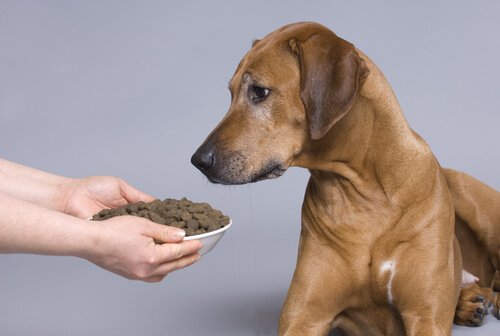Internal Canine Parasites and Health Dangers

Although they aren’t as visible as fleas or ticks, internal canine parasites can often severely affect dogs, and cause them several different health problems. In addition, they can even infect children or adults who have weak immune systems. This is why it’s extremely important to periodically deworm your pet to protect it and your family from internal canine parasites.
Signs of internal canine parasites
While the presence of internal canine parasites doesn’t have obvious symptoms in some animals, here are things to look out for:

- Lack of appetite
- Weight loss
- Vomiting
- Diarrhea
That’s why it’s important to visit the veterinarian regularly. Your vet will establish a schedule to deworm your dog as needed. This will also help you avoid any more serious health problems for your pet further down the line. In addition to that, it will benefit any other pets in the house, and your whole family.
Canine internal parasites often cause several types of health problems in dogs. In addition, they can be transmitted to humans. Therefore, you should deworm your pet periodically and follow the directions of your veterinarian.
The most common canine internal parasites
Among all the internal canine parasites that can live inside your dog’s intestines, there are a few common ones:
- Roundworms (nematodes). These are the most common. They cause diarrhea, and in serious cases, vomiting. In addition, they can migrate to the respiratory system and produce coughing. Contagion occurs through the eggs, and these eggs come out in a dog’s feces.
- Flatworms (cestodes). This is another common parasite. Flat in appearance, they resemble grains of rice. These parasites are mainly transferred through fleas. Therefore, it’s also important to consider external parasites when treating your dog. Flatworms, though infrequent, can also cause hydatid cysts in humans.
- Coccidia. These cause diarrhea with blood, especially in puppies. These parasites can be transmitted through contaminated water or through contact with an affected dog.
- Giardia. These are microscopic, unicellular parasites that cause chronic diarrhea, sometimes with blood, in most infected animals. Humans can also get this disease. This is especially true in children. It also causes diarrhea in humans.
Other consequences of internal canine parasites
Internal canine parasites have several other consequences for your dog’s health. Some of them are:
- Destruction of tissues in the area surrounding the parasites
- Obstructions, due to accumulation in some sections of the intestine
- Delayed development due to malnutrition
- Damage caused by toxicity due to the secretions and waste parasites produce. This can cause a variety of reactions in dogs
- Anemia
- Rashes
Preventing parasites in dogs
Firstly, we recommend giving your dog anti-parasitic products on a regular basis, as directed by a veterinarian. However, there are other things you can do. For example:
- Pick up any dog poop from your dog while on walks (this is, in fact, the law in most European countries)
- Analyze your pet’s feces for the possible presence of any parasites
- Avoid feeding your dog raw meat
- Keep your dog’s bed clean, and other areas your dog spends time in
How to avoid the spread of parasites from dogs to humans

In addition, to avoid possible infections, members of your family should wash their hands regularly.
Keep in mind that the transmission of parasites from dogs to humans occurs, especially in children, when the eggs and larvae of parasites are accidentally ingested.
Kids, while playing with the dog, usually have close contact with the animals and may put their hands in their mouths. As a result, they run the risk of contracting these parasites.
Therefore, take care of your pets and your family. Avoid unnecessary worrying!
Although they aren’t as visible as fleas or ticks, internal canine parasites can often severely affect dogs, and cause them several different health problems. In addition, they can even infect children or adults who have weak immune systems. This is why it’s extremely important to periodically deworm your pet to protect it and your family from internal canine parasites.
Signs of internal canine parasites
While the presence of internal canine parasites doesn’t have obvious symptoms in some animals, here are things to look out for:

- Lack of appetite
- Weight loss
- Vomiting
- Diarrhea
That’s why it’s important to visit the veterinarian regularly. Your vet will establish a schedule to deworm your dog as needed. This will also help you avoid any more serious health problems for your pet further down the line. In addition to that, it will benefit any other pets in the house, and your whole family.
Canine internal parasites often cause several types of health problems in dogs. In addition, they can be transmitted to humans. Therefore, you should deworm your pet periodically and follow the directions of your veterinarian.
The most common canine internal parasites
Among all the internal canine parasites that can live inside your dog’s intestines, there are a few common ones:
- Roundworms (nematodes). These are the most common. They cause diarrhea, and in serious cases, vomiting. In addition, they can migrate to the respiratory system and produce coughing. Contagion occurs through the eggs, and these eggs come out in a dog’s feces.
- Flatworms (cestodes). This is another common parasite. Flat in appearance, they resemble grains of rice. These parasites are mainly transferred through fleas. Therefore, it’s also important to consider external parasites when treating your dog. Flatworms, though infrequent, can also cause hydatid cysts in humans.
- Coccidia. These cause diarrhea with blood, especially in puppies. These parasites can be transmitted through contaminated water or through contact with an affected dog.
- Giardia. These are microscopic, unicellular parasites that cause chronic diarrhea, sometimes with blood, in most infected animals. Humans can also get this disease. This is especially true in children. It also causes diarrhea in humans.
Other consequences of internal canine parasites
Internal canine parasites have several other consequences for your dog’s health. Some of them are:
- Destruction of tissues in the area surrounding the parasites
- Obstructions, due to accumulation in some sections of the intestine
- Delayed development due to malnutrition
- Damage caused by toxicity due to the secretions and waste parasites produce. This can cause a variety of reactions in dogs
- Anemia
- Rashes
Preventing parasites in dogs
Firstly, we recommend giving your dog anti-parasitic products on a regular basis, as directed by a veterinarian. However, there are other things you can do. For example:
- Pick up any dog poop from your dog while on walks (this is, in fact, the law in most European countries)
- Analyze your pet’s feces for the possible presence of any parasites
- Avoid feeding your dog raw meat
- Keep your dog’s bed clean, and other areas your dog spends time in
How to avoid the spread of parasites from dogs to humans

In addition, to avoid possible infections, members of your family should wash their hands regularly.
Keep in mind that the transmission of parasites from dogs to humans occurs, especially in children, when the eggs and larvae of parasites are accidentally ingested.
Kids, while playing with the dog, usually have close contact with the animals and may put their hands in their mouths. As a result, they run the risk of contracting these parasites.
Therefore, take care of your pets and your family. Avoid unnecessary worrying!
All cited sources were thoroughly reviewed by our team to ensure their quality, reliability, currency, and validity. The bibliography of this article was considered reliable and of academic or scientific accuracy.
- Blagburn, B. (2010). Internal Parasites of Dogs and Cats. Novartis Animal Health US, Inc.
-
Traversa, D. (2012). Pet roundworms and hookworms: A continuing need for global worming. Parasites and Vectors. https://doi.org/10.1186/1756-3305-5-91
-
Conboy, G. (2009). Cestodes of Dogs and Cats in North America. Veterinary Clinics of North America – Small Animal Practice. https://doi.org/10.1016/j.cvsm.2009.06.005
This text is provided for informational purposes only and does not replace consultation with a professional. If in doubt, consult your specialist.








